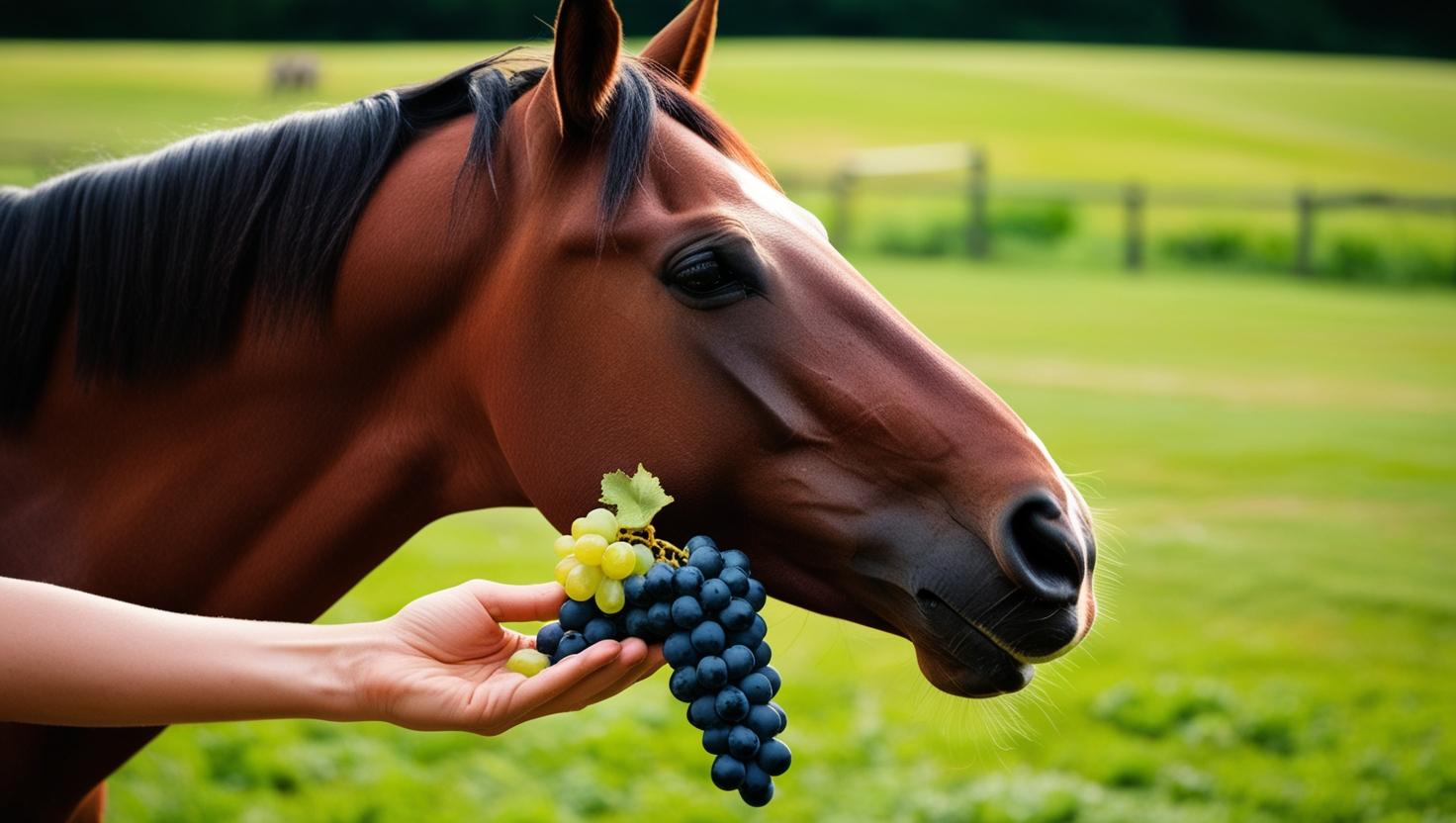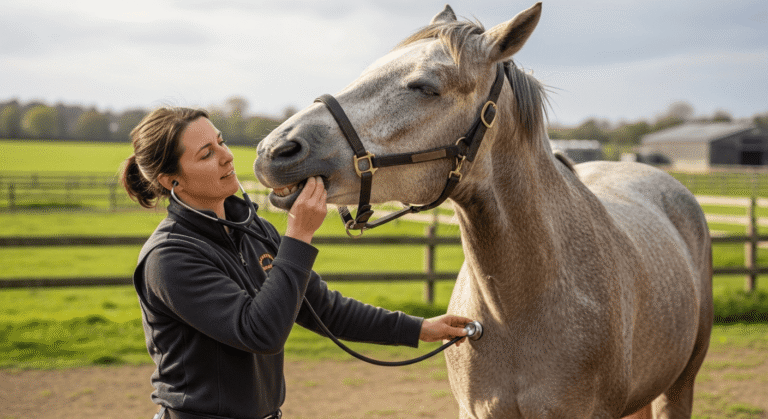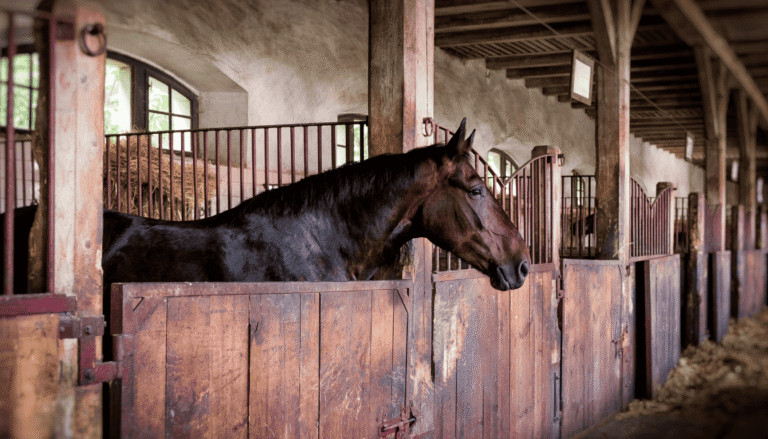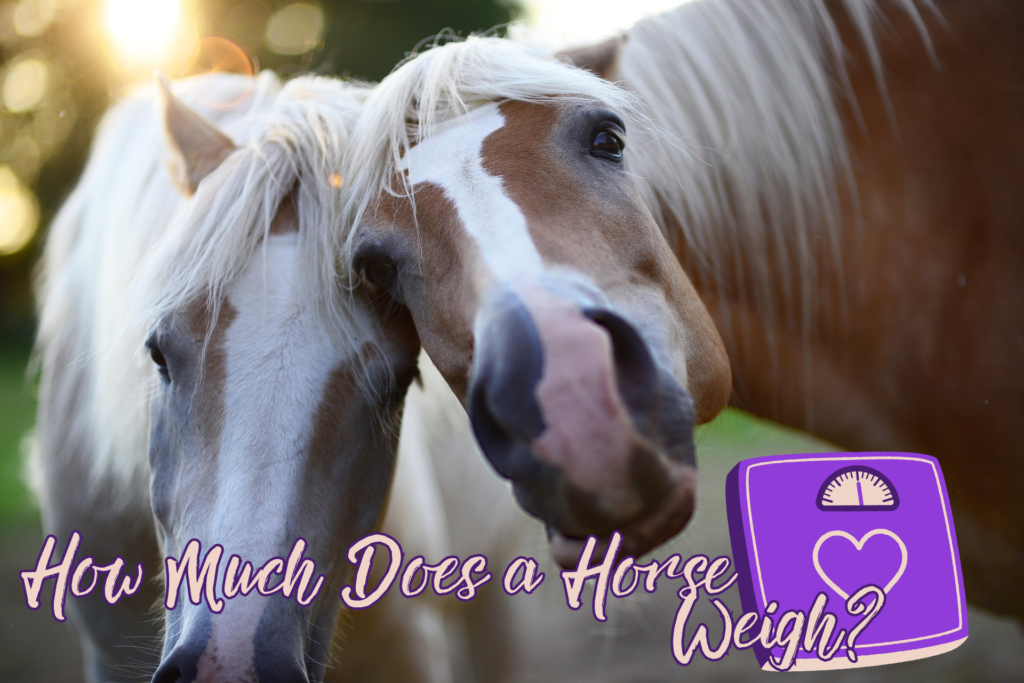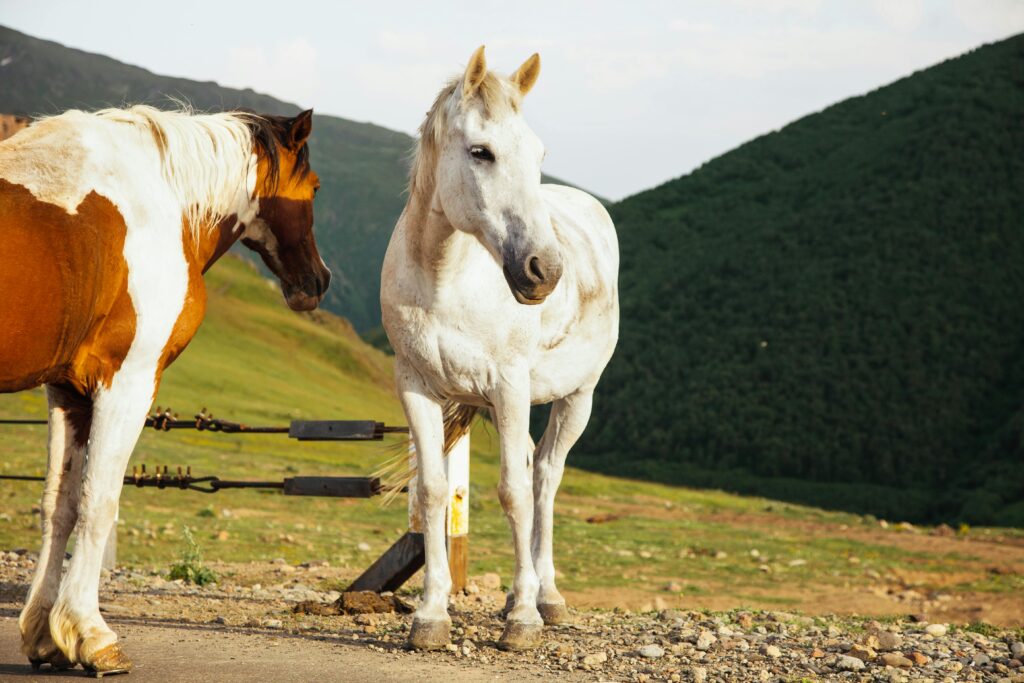Can Horses Eat Grapes?
The Basics of Equine Diet and Nutrition
When it comes to feeding horses, understanding their dietary needs is crucial for maintaining their health and well-being. Horses are herbivores with a digestive system designed to process a diet high in fiber, primarily consisting of grasses and hay. However, many horse owners like to supplement their horse’s diet with treats, including fruits and vegetables. While some fruits are safe and even beneficial for horses, others can pose significant health risks. One fruit that often raises questions is the grape.
- Can horses eat grapes?
- What are the potential risks and benefits?
This blog will delve into the nutritional profile of grapes, the risks and benefits of feeding them to horses, how they compare to other fruits, and expert opinions on the matter.
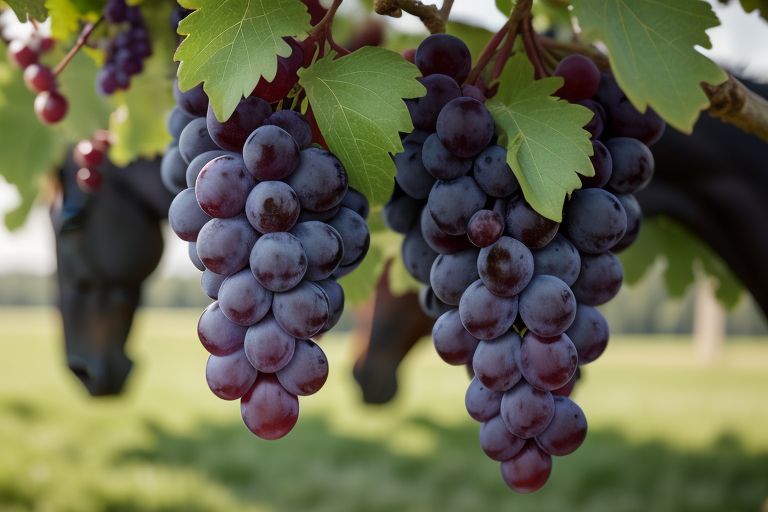
Nutritional Profile of Grapes: What Do They Offer?
Grapes are one of the most consumed fruits valued for their sweet taste and their good nutritional profile by humans. Generally, grapes are considered to be a healthful snack due to their richness in vitamins, minerals, and antioxidants. But what is their value in relation to the nutrition of horses? Although horses have different nutritional needs compared to humans, learning their nutritional contents can enable the understanding of their possible benefits and risks to horses.
Vitamins in Grapes
Grapes are a good source of several vitamins important in maintaining health. Here’s a closer look at the key vitamins found in grapes and their potential benefits for horses:
Vitamin C:
- Function: Vitamin C is a powerful antioxidant that protects the cells from damage by free radicals. It further assists the body’s immune function and helps prevent infections and diseases.
- For Horses: While horses can synthesize their own vitamin C in their liver, additional dietary sources may provide extra support, especially during times of stress, illness, or intense physical activity. However, grapes are not a primary source of vitamin C for horses, as their needs are typically met through their regular diet.
- Vitamin K
- Role: Vitamin K is crucial for blood clotting and bone health; it helps regulate the amount of calcium absorbed and aids in maintaining strong bones.
- For Horses: This vitamin is important in horses, especially for healthy bones and to avoid excessive bleeding. However, horses usually get enough vitamin K from fresh forage and hay, so grapes are not a required source.
Vitamin B6 (Pyridoxine)
- Function: The nervous system requires vitamin B6 to develop, manufacture neurotransmitters, and finally metabolize proteins, fats, and carbohydrates.
- For Horses: Vitamin B6 is a nutrient required in horse diets; however, the dietary requirement for horses is typically met by what they ingest through forage and grains. Grapes contain very small quantities of this vitamin and are, therefore, of little consequence in the horse’s diet.
Other Nutrients Present in Grapes
Aside from vitamins and antioxidants, grapes also have trace amounts of other nutrients that could help in maintaining overall health:
- Minerals: Grapes provide trace amounts of minerals like potassium, which is important for muscle function and electrolyte balance. However, the levels are not significant enough to make grapes a primary source of minerals for horses.
- Fiber: Grapes contain a small percentage of dietary fiber, which should help the digestion of horses; however, compared to the intake they already get from hay and grass, the fiber in grapes is minute.
Grape Sugar Content
Probably the most distinctive feature of grapes, however, is the amount of sugar they carry. Grapes are full of natural sugars-chiefly fructose and glucose-end, and that gives them that sweet taste. What this means to horses:
- Quick Energy Source: The sugar in grapes provides a quick source of energy, possibly even helping equine athletes with activities based heavily on short intervals of high demand. This seldom is necessary since horses get quite sufficient energy from regular forage and concentrates.
- Risk of Weight Gain and Metabolic Issues: Grapes contain a lot of sugar, and if fed in excess, this can be problematic. Horses that consume too much sugar are at risk of weight gain, insulin resistance, and metabolic disorders such as EMS or laminitis. These conditions have serious health implications and should be carefully managed through diet.
- Dental Health Concerns: The same excessive intake of sugar also may be bad for dental issues like tooth decays in horses. Though grapes are not typically the primary culprits, even they must be given with control so as not to aggravate the problem.
Grape Antioxidants
Grapes are particularly rich in antioxidants, phytochemicals that help to neutralize free radicals and reduce oxidative stress in the body. Perhaps one of the most well-recognized antioxidants in grapes is resveratrol, studied for years for its possible health benefits. This is how these antioxidants may affect horses:
- Resveratrol:
- Anti-Inflammatory Properties: There is evidence that resveratrol exhibits anti-inflammatory properties that could be useful in horses suffering from arthritis or other inflammatory diseases.
- Cardiovascular Health: Resveratrol might have a positive impact on cardiovascular health by mediating increased blood flow and the prevention of blood clots. While this aspect is more applicable to humans, horses with cardiac issues may benefit from these actions too.
- Antioxidant Support: Resveratrol works against oxidative stress that could lead to cellular damage, aging, and the development of disease. This may be useful for older horses or those under physical stress.
- Other Antioxidants:
Other antioxidants found in grapes include flavonoids and quercetin, which have been associated with improved immune function and anti-inflammatory effects. These might provide added advantages to horses, though the impact would be very minimal if grapes are given in small portions.
Nutritional Benefits for Horse – Summary
While grapes do provide some degree of nutritional value to horses, including some vitamins, antioxidants, and a small amount of fiber, these are relatively minor considerations in the context of the overall diet of horses. The horse derives the lion’s share of its nutritional requirements from forage, hay, and balanced concentrates, which better and more appropriately provide a full nutrient profile for the species.
The high sugar content in grapes is a major drawback, as it can lead to weight gain, metabolic issues, and dental problems if fed in excess. Besides, the choking hazard associated with grapes makes them not an ideal treat for horses.
The Risks and Benefits of Feeding Grapes to Horses
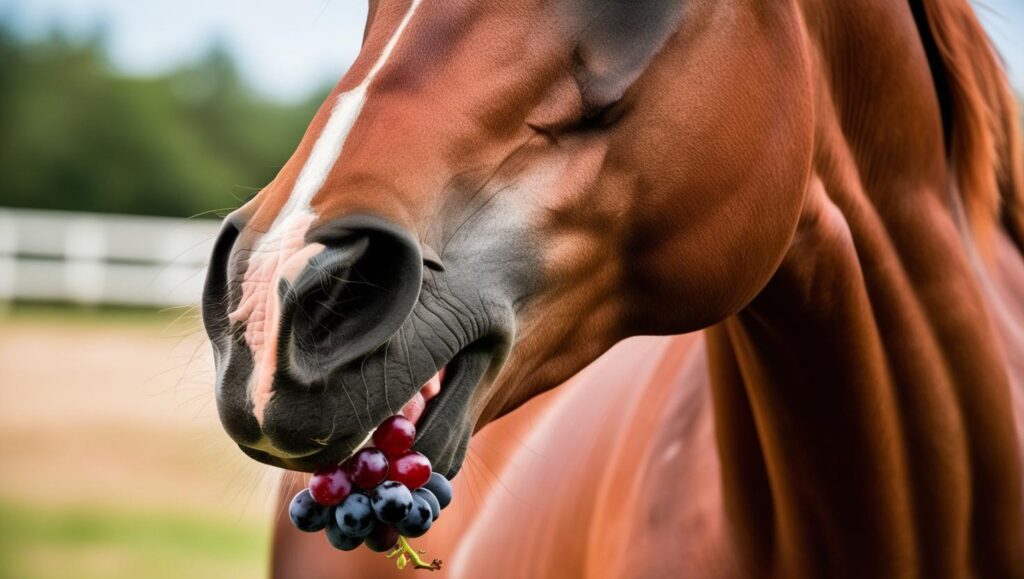
Benefits of Grapes to Horses
Nutritional Boost
- Grapes do contain some essential vitamins, including vitamin C, vitamin K, and some B vitamins, which can help boost a horse’s general health. Besides that, grapes contain a variety of antioxidants such as resveratrol that may help protect against oxidative stress and support immune function. Although horses generally get most of their nutrition from forage, grapes can be used as a secondary source for these nutritional components.
Hydration:
- Since grapes are approximately 80% water, they may become refreshing snacks, particularly during summer periods and post-workout conditions. This is helpful for the horses that don’t drink enough water and will keep them much better hydrated to support all bodily functions.
Palatability:
- Grapes are also one of the sweetest fruits, which may make them quite attractive to horses. This will be helpful for training or rewarding your horse, as horses will always appreciate such treats more than others. Grapes will also give your horse a break from carrots and apples, the usual treats given to horses.
Low in Fat:
- Grapes are naturally low in fat, making them a good treat for horses needing to be on low-fat diets. This proves very advantageous for horses with conditions like hyperlipidemia or those that easily gain weight leading them to obesity.
Risks of Grapes for Horses
Choking Hazard:
- The small, round shape of grapes can be a choking hazard, especially when given whole. Horses could swallow them whole without chewing them properly, which may lead to blockages in the esophagus. Cutting the grapes into smaller pieces or mashing them may minimize the risk. Even so, choking remains a possibility with horses that eat quickly.
High Sugar Content:
- Grapes are relatively high in natural sugars, which may become problematic if fed in large amounts. Too much sugar can lead to weight gain, insulin resistance, and metabolic disorders like EMS or laminitis. Horses with pre-existing conditions such as Cushing’s disease or EMS should not be given high-sugar treats at all, as they are especially vulnerable.
Possible Toxicity Issues:
- While grapes are not considered inherently toxic to horses, there is some gray area regarding their safety. Grapes and raisins cause acute kidney failure in dogs, although the toxic mechanism is not well understood. Some anecdotal reports suggest horses may also be at risk of kidney damage from grapes, but scientific evidence is lacking. Until more research is conducted, it is best to err on the side of caution and not feed horses large amounts of grapes.
Digestive Upset:
- Horses have sensitive digestive systems, and the introduction of new foods-especially in large amounts-can easily cause gastrointestinal disturbances such as colic or diarrhea. Since grapes are not fibrous but contain high sugar levels, overfeeding may disturb the balance of the hindgut microbiome. This is surely important to note for horses with a history of digestive issues.
Pesticide Residue:
- Commercial grapes are exposed to pesticides. This might have negative effects if the horses consume it in large quantities. This can, however, be minimized by washing grapes prior to feeding, but will be one issue owners will deal with who value organic or pesticide-free diets for their horses.
Imbalance of Diet:
- While grapes can be somewhat nutritious, they should not be a substitute for a properly balanced diet based on a horse’s needs. Too much reliance on such treats will cause nutritional imbalance since they do not have the required fiber, protein, and minerals necessary for horses from forage and concentrates.
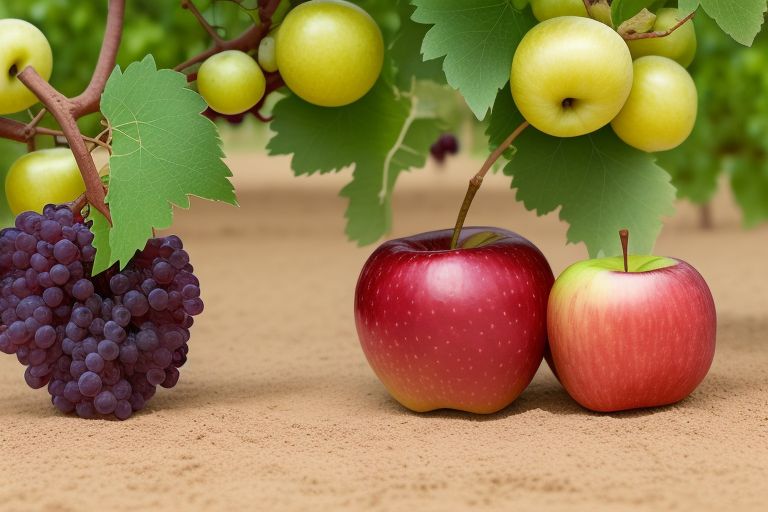
How Grapes Compare to Other Fruits in an Equine Diet
When considering adding fruits to your horse’s diet, it’s important to compare the nutritional benefits and risks of different options. Here’s how grapes stack up against other common fruits fed to horses:
Apples vs. Grapes for Horses
- Apples: Apples are a popular treat for horses and are generally considered safe when fed in moderation. They are lower in sugar compared to grapes and provide a good source of fiber, vitamins, and antioxidants. However, like grapes, apples should be fed in moderation to avoid digestive upset and weight gain.
- Grapes: While grapes offer some nutritional benefits, their high sugar content and potential choking hazard make them a less ideal choice compared to apples. Additionally, the potential toxicity concerns associated with grapes make them a riskier option.
Safe Fruits for Horses
Some other fruits that are generally considered safe for horses include:
- Carrots: High in beta-carotene and fiber, carrots are a nutritious and low-sugar treat for horses.
- Bananas: Rich in potassium and easy to digest, bananas can be a healthy treat when fed in moderation.
- Watermelon: High in water content and low in sugar, watermelon can be a refreshing treat, especially in hot weather.
Expert Opinions: Veterinarian Insights on Feeding Grapes to Horses
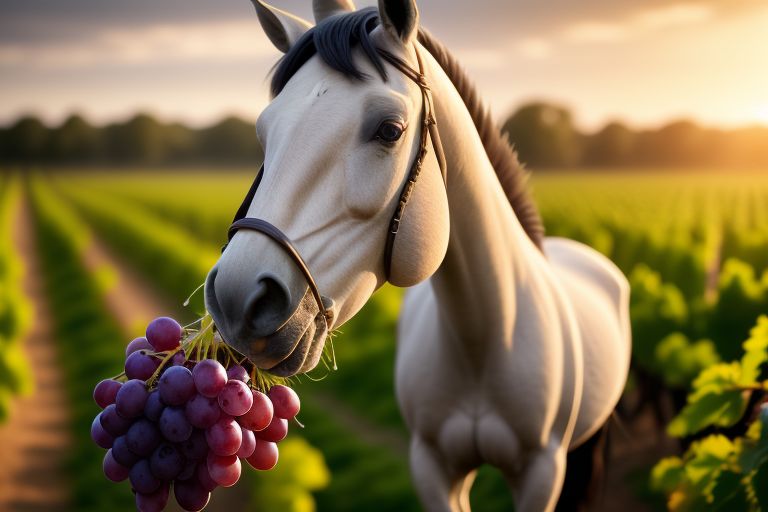
When it comes to feeding grapes to horses, it’s essential to consider the advice of equine veterinarians and nutrition experts. Here are some insights from professionals in the field:
Vet Advice on Horse Diet
- Moderation is Key: Most veterinarians agree that treats, including fruits, should be fed in moderation. Overfeeding treats can lead to weight gain, digestive issues, and other health problems.
- Monitor for Adverse Reactions: If you decide to feed grapes to your horse, monitor them closely for any signs of adverse reactions, such as colic, diarrhea, or changes in behavior.
- Consult Your Vet: Before introducing any new food to your horse’s diet, it’s always a good idea to consult with your veterinarian. They can provide personalized advice based on your horse’s specific health needs and dietary requirements.
Equine Vet Recommendations
- Avoid Feeding Grapes to Horses with Metabolic Issues: Horses with insulin resistance, Cushing’s disease, or other metabolic conditions should avoid high-sugar treats like grapes.
- Consider Safer Alternatives: If you’re looking for a healthy treat for your horse, consider safer alternatives like carrots or apples, which are lower in sugar and pose fewer risks.
Conclusion:
Making Informed Decisions About Including Grapes in Your Horse’s Diet
In conclusion, while grapes offer some nutritional benefits, they also come with potential risks that should not be overlooked. The high sugar content, choking hazard, and potential toxicity concerns make grapes a less ideal choice compared to other fruits like apples and carrots. If you do choose to feed grapes to your horse, it’s essential to do so in moderation and monitor for any adverse reactions.
Ultimately, the best approach is to consult with your veterinarian before introducing any new food to your horse’s diet. They can provide personalized advice based on your horse’s specific health needs and dietary requirements. By making informed decisions and prioritizing your horse’s health, you can ensure they receive a balanced and nutritious diet that supports their overall well-being.
Remember, treats should never replace the core components of a horse’s diet, which should consist primarily of high-quality forage, such as hay and grass. By focusing on a balanced diet and providing treats in moderation, you can keep your horse healthy, happy, and thriving.

